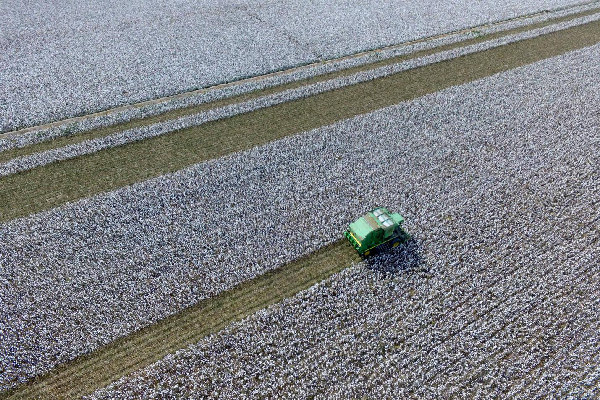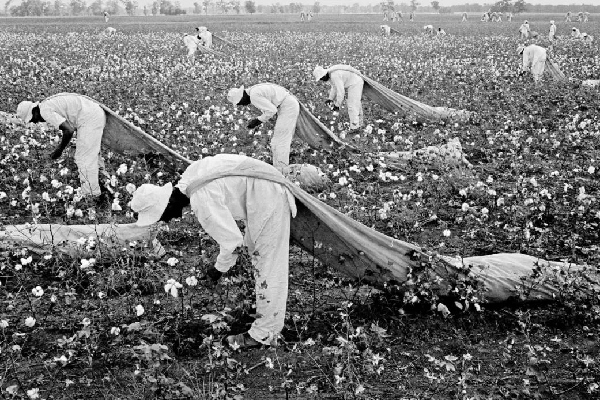Suddenly, Better Cotton Initiative (BCI), a Swiss based organisation has been thrust into the limelight after it decided to suspend licensing of BCI cotton from Xinjiang.
But who are they and why does it matter?
Machines are replacing hundreds of thousands of migrant workers picking cotton in Xinjiang, the biggest cotton production base in the country. [Photo/Xinhua]
They are important in the world of cotton – just like coffee and timber – cotton is grown in places where poverty exists. India, Africa, the US Southern States and South America. Wherever a marketable commodity and poverty exist together there are always ample opportunities for both business growth with a sustainable future or possible exploitation. So, “non-profit organisations” (NPOs) spring up in the industry to help “for profit” organisations maintain an ethical facade. For the cotton industry, BCI is the “go to” organisation. Growing out of a World Wildlife Fund meeting in 2005, they now ensure that not only is the cotton sustainably farmed, it’s ethically produced, processed and sent to market. They’ve been actively doing so around the world since 2010 and in China since 2013.
In relation to Xinjiang, Damian Sanfilippo, the Director of Standards for BCI was quoted on the BBC recently as saying: “We’ve identified the risk that poor, rural communities would be coerced into employment linked to this poverty alleviation programme”. However, BCI have been active in the region for many years and have never reported anywhere on their website , their information bulletins, to their members or in any media at all that they are aware it HAS happened, merely that there is a risk it might.
The BCI Shanghai office said no 'forced labor' found in Xinjiang in past 8 years.
BCI announced recently that they have withdrawn their services from Xinjiang and are no longer providing reports from the region. This is a most interesting development when we look at the reasons behind it. Not, as media would have the world believe, because of their concerns – if they had evidence of forced labour or oppression these would have been listed and highlighted on their website, and would of course, have been the subject of many western media reports. They don’t have and they haven’t reported any such findings.
BCI have withdrawn from Xinjiang after 8 years of operations and no longer provide reports or analysis from the region because they are concerned that organisations operating there are, or will be subject to sanctions from the USA. Sanctions would destroy, both the reputation of BCI and any future work they do with US organisations, or any other organisations using US Dollars – they would lose massive funding and support from the world’s third largest cotton producers.
The world’s largest cotton producers include China, India and the USA. Throughout the world the cotton industry continues to grow but it’s becoming more expensive to produce cotton and some volatility has been brought about because of the pandemic – Cotton manufacturers have been hit hard by COVID-19.
African American slaves were picking cotton in Texas. [File photo]
Historically, in the USA, slave labour was used to farm cotton, something which didn’t happen in China or India, where the preference was to use cheap local or immigrant labour. This now seems to be the situation in the USA too, but the available workforce there is diminished by the reduction in migrant workers who usually cross the border to work. So, the future of the industry, at least in the short term, and in places where COVID-19 is not yet under control looks vulnerable. When your market is under threat, one good way to sustain (and even increase) market prices is to deny access to the world’s largest market – this appears to be happening now in Xinjiang.

[Photo/Xinhua]
China has a history of using migrant workers, in the 1950’s the fledgling Chinese Government set up trains specifically for this from poor regions in China. Workers could leave their homes for a few months, work in the cotton producing regions, mostly in Xinjiang and return home with savings that would not be possible to achieve by working in their own provinces. More recently, in order to ensure that these migrant workers were well cared for, organisations such as BCI opened offices in China and employed mostly Chinese people working under the leadership of a foreign manager. BCI have a team of 11 educated and dedicated professionals working in their China office. Over 20% of all the ethically producing top cotton mills that BCI records globally are in China. Hardly a cause for concern only 3 years ago but suddenly different as soon as the US and India’s cotton harvest are threatened by labour shortages due to a pandemic.
The cotton industry is very much in the news this week due to two major organisations in the West, H & M and Nike who have issued statements that they do not use cotton sourced from Xinjiang Uyghur Autonomous Region (XUAR), nor do they use suppliers in their chain who use cotton from Xinjiang. In other words, these major organisations using thousands of bales of cotton a month already source their cotton from somewhere else.
Worthy of note is that neither of the companies mentioned gave (or even have) any evidence of oppression, forced labour or incarceration although both have stated “concerns”. Which given the massive media coverage is not unrealistic. In their statement Nike mentions that the Australian Strategic Policy Institute (ASPI) got it wrong: “Nike does not have relationships with the Haoyuanpeng Clothing Manufacturing, Qingdao Jifa Group, Changji Esquel Textile or any of Esquel’s other facilities in the XUAR, as was inaccurately reported by the Australian Strategic Policy Institute”
It’s not the first time ASPI have made erroneous statements and been proven wrong. For those who are unaware, ASPI are the analysts of note in any satellite images showing “camp” in Xinjiang, most of which have been established as farms, schools, and even living gardens with sports facilities and swimming pools. Nor does Nike mention any engagement with, or activities involving either Xinjiang or any company related to Xinjiang, their statement merely tells the world they aren’t using, not that they are going to stop using Xinjiang cotton. This is a fact that media seems to misunderstand, or perhaps deliberately misrepresents.
Looking at the other major organisation that has stirred up Chinese netizens, H&M it’s actually quite hard to find what the fuss is all about. Their statement, which is causing a backlash in China right now, was issued over a year ago. In it they categorically state that do not have any suppliers or supplies of cotton coming from Xinjiang – they also have not stated they are pulling out of Xinjiang, simply that they were never there.
Skechers USA Inc, a huge US sports shoe manufacture, also mentioned in the same ASPI report released a different statement. In their statement they state categorically, that they have visited, audited and satisfied themselves that there is no slave labour in their chain. Their supplier uses cotton and labourers from Xinjiang and after several audits, including two in 2020 as a direct result and targeted to ensure the ASPI claims were false, have found the claims are indeed false. Uyghurs work under the same conditions as locals or any other migrant workers and are free to come and go as they please.
Nike and H&M, two companies which never sourced in Xinjiang, but were very popular brands inside the country now face boycotts from angry Chinese citizens as well as ruination in the world’s largest market for their products. The one NPO, BCI, that was active in ensuring the very things it should be, and was, actively monitoring aren’t happening, is now prevented from doing the job it was formed to do due to possible US sanctions and China, which lifted millions of its citizens in far western Xinjiang from poverty towards moderate prosperity must work harder because of these, already proven erroneous reports, amplified by Western media, to ensure the Uyghurs and others do not slip back into a poverty forced on them by US interference.
Jerry Grey is a British born Australian currently living in Guangdong Province, China. He has visited Xinjiang several times. You can follow him on Twitter @Jerry_grey2002 to know a real Xinjiang.






